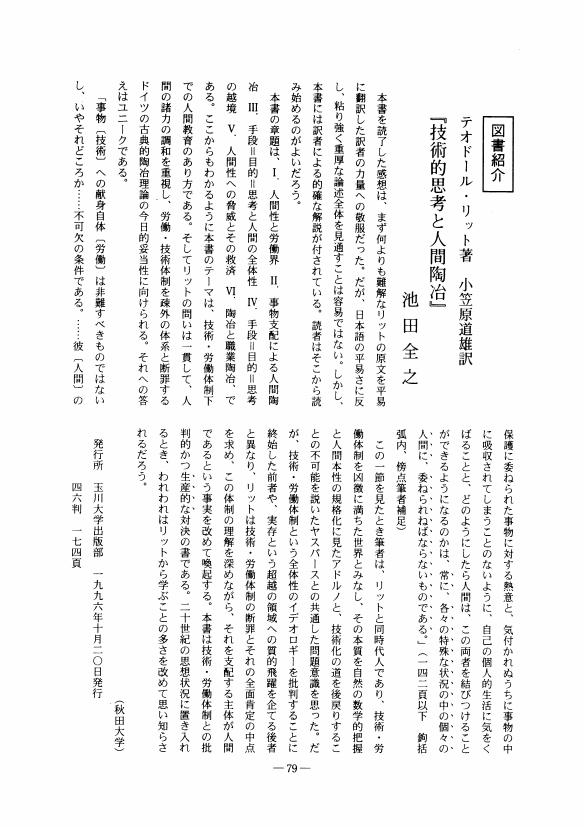1 0 0 0 OA 寓意家、収集家、遊民 : ヴァルター・ベンヤミンのアレゴリー的解釈術の基本構造
- 著者
- 池田 全之
- 出版者
- 教育思想史学会
- 雑誌
- 近代教育フォーラム (ISSN:09196560)
- 巻号頁・発行日
- vol.13, pp.227-246, 2004-09-18 (Released:2017-08-10)
教育思想史研究において、我々は過去のテキストを読解している。だが、この読解において過去のテキストの含意を、我々は無自覚に自身の意味づけ作用の中に回収してはいないか。教育思想史研究でなされてきた他者性を巡る議論を踏まえれば、こうした疑問が脳裏に去来する。現代思想の動向から考えれば、テキストが孕む理解不可能性(他者性)を極限まで尊重する解釈術としては、デリダの業績が真っ先に思い浮かぶ。だが、デリダも指摘するように、こうした解釈術の先駆けとして、ベンヤミンの批評手法がある。当初翻訳論として提起された、テキストの真理そのもの不在と諸翻訳の協働によるその再現という解釈術構想は、『ドイツ悲劇の根源』の序論で、現象の概念的弁別と理念におけるその救済の思想に拡張され、『パサージュ論』において、対立項の緊張の極みでの真理の閃き構想(静止状態の弁証法)に帰着した。本稿は、文芸批評の方法論から始まり社会批判の方法に深化したベンヤミンの解釈術の構造を、その鍵語であるアレゴリーに着目して解明し、破壊即救済というそれの特異なテキスト理解論を明らかにした。
- 著者
- 池田 全之
- 出版者
- 教育思想史学会
- 雑誌
- 近代教育フォーラム (ISSN:09196560)
- 巻号頁・発行日
- vol.14, pp.1-18, 2005-09-18 (Released:2017-08-10)
今回の報告のテーマは「ドイツ観念論のアクチュアリティ」である。だが、ドイツ観念論は絶対者の学であり、近代批判の脈絡で、近代を形成した「確固とした完結した主体」という幻想に立つ主体性の形而上学の極北とみなされ、そのまま支持することが今日では難しいとされている。これまで筆者は、フィヒテの知識学を検討しながら、主体がドイツ観念論の文脈でどのように定式化されたのかを整理し、シェリング(F.W.J. Schelling 1775-1854)において、絶対者への渇望がドイツ観念論の枠内で辿った顛末を究明したが、今回はシェリングの中期以降の試みを辿り直す。というのも、ドイツ観念論研究を始めたときから念頭を去らない問い、「絶対者に基づく形而上学的思考は妥当性を失っているのか」、を真剣に考えなければならないと思われるからである。たしかに現代思想からの批判を侯つまでもなく、現実遊離した超越的な次元を想定して、そこに現実を基礎づけることは許されないだろう。しかし、20世紀の思想を参照すれば、例えばユートピアの痕跡としての芸術作品による社会批判のTh・アドルノの試み(『美学理論(Asthetische Theorie)』)や、脱構築不可能な正義からの呼びかけによる法の脱構築を説くJ・デリダの「亡霊学(hantologie)」には、超越との関係で内在をいかに批判するのかという視点が復活していると思われるからである。こうした問題意識から筆者は、一見関係が見えにくいシェリングと、デリダもまた超越の現代的様態を解明すべく取り上げたベンヤミンを重ねあわせることにより、そこに閃くものを掬い取りたいと思う。
1 0 0 0 OA 倉岡正雄著『フレーベル教育思想の研究』
- 著者
- 池田 全之
- 出版者
- 教育哲学会
- 雑誌
- 教育哲学研究 (ISSN:03873153)
- 巻号頁・発行日
- vol.1999, no.80, pp.81-88, 1999-11-10 (Released:2009-09-04)
1 0 0 0 OA テオドール・リット著小笠原道雄訳『技術的思考と人間陶冶』
- 著者
- 池田 全之
- 出版者
- 教育哲学会
- 雑誌
- 教育哲学研究 (ISSN:03873153)
- 巻号頁・発行日
- vol.1997, no.75, pp.79, 1997-05-10 (Released:2009-09-04)
1 0 0 0 OA 後期シェリング哲学の教育学的意味について その出会い論を中心にして
- 著者
- 池田 全之
- 出版者
- 教育哲学会
- 雑誌
- 教育哲学研究 (ISSN:03873153)
- 巻号頁・発行日
- vol.1988, no.57, pp.54-67, 1988-05-10 (Released:2009-09-04)
- 参考文献数
- 40
In this paper I investigate the progress in Schelling's thought which started with a philosophy of identity (Identitätsphilosophie) and ended up in insisting on the difference between negative philosophy (negative Philosophie) and positive philosophy (positive Philosophie) paying special attention to the change of principles which thus occurred. From the beginning to the end, he continued trying to solve the problem 'How can we recognize the Absolute ?'. At first Schelling thought it was by intellectual intuition that we could recognize it. However as his thought deepened, the appropriateness of intellectual intuition became doubtful to him, and because of the failure of his middle philosophy, finally it was abandoned. Contrary to his early philosophy, in which he had maintained the possiblity of knowing the Absolute, his later philosophy insisted that it is impossible for us to know the Absolute directly. In his later philosophy he adopted ecstasy (Ekstase) as a new principle. Hence, Schelling changed his methodological principle completely during the development of his thought. Therefore, I examine the meaning of this change from an anthropological-pedagogical point of view to arrive at some valuable clues reflecting on the nature of encounter (Begegnung) in educational practice.
1 0 0 0 承認と人間形成(コロキウム1)
1 0 0 0 OA 承認と人間形成(コロキウム1)
本研究は、戦後ドイツを通底する課題である「過去の克服」という課題に、これまで等閑視されてきた精神史、文化史、広く人間形成の側面からその本質に迫ることを目的としている。本年度は、7名の分担者が交付申請書記載のそれぞれの研究テーマに則して、文献・資料の分析を進め、2回の全体研究会を通じて、共同研究としての統一性を保ちつつ研究を進めた。より具体的には、まず遠藤は、州憲法及び基本法の制定を通して、ナチズム克服の理念としてキリスト教の復権が行われたこと、小玉はナチズムにより解体の危機に瀕していた家族の再建に関する議論と施策が行われたこと、渡邊はナチ教義の注入手段と化していた歴史教育の再建において、ヴェーニガーの「政治的歴史教育」の理念が重要な役割を果たしたことを明らかにした。また、池田は20世紀ドイツを代表する哲学者ハイデガー、リット、ヤスパースの「過去」に対する思想的対応の相違を腑分けし、今井は「政治的成人性」の理念を中核とするアドルノの教育思想の特質を「過去の克服」との関連で明らかにし、對馬は反ナチ運動の復権を司法界において最初に宣明した「レーマー裁判」の意義を検事ブリッツ・バウアーの思想と行動に関連づけて明確にした。そして、山名は「追悼施設教育学」の成立経緯とその今日的意味を「記憶文化」と関連づけて明らかにした。これらの研究成果は、平成23年3月に上梓された對馬達雄編著『ドイツ過去の克服と人間形成』の各論文として収録された。

